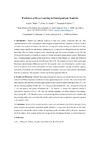Identificador persistente para citar o vincular este elemento:
https://accedacris.ulpgc.es/jspui/handle/10553/74752
| Campo DC | Valor | idioma |
|---|---|---|
| dc.contributor.author | Núñez Alonso, Juan Luis | en_US |
| dc.contributor.author | Fernández Sarmiento, Celia | en_US |
| dc.contributor.author | Grijalvo Lobera, Fernando | en_US |
| dc.date.accessioned | 2020-10-14T14:22:41Z | - |
| dc.date.available | 2020-10-14T14:22:41Z | - |
| dc.date.issued | 2014 | en_US |
| dc.identifier.uri | https://accedacris.ulpgc.es/handle/10553/74752 | - |
| dc.description.abstract | Students use different strategies to learn new content. Sometimes they use more superficial methods, such as repeating the material again and again until they remember it, whereas on other occasions they prepare and organize the material, carrying out a deeper learning. In superficial learning, students adopt a passive role and in deep learning they try to relate the new information with the previous knowledge. The use of deep strategies entails remembering better the content and higher results. The aim of the present research is to identify the predictors of deep learning in undergraduate students. Participants were 276 undergraduate students of University of Las Palmas de Gran Canaria, 241 female and 29 male (6 missing values), with an average age of 21.80 years (SD = 2.93). The Spanish version [1] of the Assessment Experience Questionnaire (AEQ) was used. For this research, items were formulated in a positive sense and seven subscales were used as independent variables: quantity of effort, coverage of syllabus, quantity and quality of feedback, use of feedback, appropriate assessment, clear goals and standards, and learning from the examination. The dependent variable was the deep approach subscale. | en_US |
| dc.language | eng | en_US |
| dc.source | International Congress on Education, Innovation and Learning Tecnologies. Barcelona, España, 2014 | en_US |
| dc.subject | 580106 Evaluación de alumnos | en_US |
| dc.subject | 580206 Análisis, realización de modelos y planificación estadística | en_US |
| dc.title | Predictors of deep learning in undergraduate students | en_US |
| dc.relation.conference | International Congress on Education, Innovation and Learning Tecnologies | en_US |
| dc.investigacion | Ciencias Sociales y Jurídicas | en_US |
| dc.type2 | Actas de congresos | en_US |
| dc.utils.revision | Sí | en_US |
| dc.identifier.ulpgc | Sí | es |
| item.fulltext | Con texto completo | - |
| item.grantfulltext | open | - |
| crisitem.author.dept | GIR IATEXT: Didáctica, Aprendizaje y Motivación en Contextos Específicos | - |
| crisitem.author.dept | IU de Análisis y Aplicaciones Textuales | - |
| crisitem.author.dept | Departamento de Psicología, Sociología y Trabajo Social | - |
| crisitem.author.dept | GIR IATEXT: Didáctica, Aprendizaje y Motivación en Contextos Específicos | - |
| crisitem.author.dept | IU de Análisis y Aplicaciones Textuales | - |
| crisitem.author.dept | Departamento de Educación | - |
| crisitem.author.orcid | 0000-0002-2400-7843 | - |
| crisitem.author.orcid | 0000-0002-8910-7773 | - |
| crisitem.author.orcid | 0000-0002-1316-8115 | - |
| crisitem.author.parentorg | IU de Análisis y Aplicaciones Textuales | - |
| crisitem.author.parentorg | IU de Análisis y Aplicaciones Textuales | - |
| crisitem.author.fullName | Núñez Alonso, Juan Luis | - |
| crisitem.author.fullName | Fernández Sarmiento, Celia | - |
| crisitem.author.fullName | Grijalvo Lobera, Fernando | - |
| Colección: | Actas de congresos | |
Visitas
95
actualizado el 31-oct-2024
Descargas
24
actualizado el 31-oct-2024
Google ScholarTM
Verifica
Comparte
Exporta metadatos
Los elementos en ULPGC accedaCRIS están protegidos por derechos de autor con todos los derechos reservados, a menos que se indique lo contrario.
